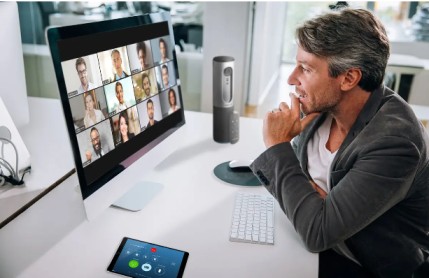Business
From online marketing to Zoom meetings – making the most of your online presence while beefing up cyber-security.

If you’re too young to remember a life without computers, even before they were used regularly in the workplace – you’d be in for a shock if you went back 40 years in a time machine to a typical 1980s office.
Try to imagine desks without any form of computers; just perhaps a typewriter, a corded phone plugged into the wall, a Rolodex of contact cards and green metal filing cabinets stuffed full of folders containing A4 paper. There would probably be an ashtray on the desk because smoking cigarettes was very common in offices until it was banned in the USA in the late 90s and early noughties. Europe generally followed suit in the early 2000s when smoking in the workplace became illegal in the UK and many other European countries.
That’s how business used to be done. There were client and financial records of course, but data was all stored on paper in folders and files. Computers didn’t really come into regular office use until the early 1990s – and even then, they came in the form of word processing machines that were really just souped-up typewriters that saved textual content on 5” floppy disks. And don’t even get started about the bottles of whisky and glasses in every boss’s desk bottom drawer!
Fast forward to the present and it’s now unusual to see a filing cabinet in an office, let alone a legal pad and a pencil for use during meeting notes. Zoom call transcriptions are now provided by AI and nothing left to human recollection. Email, voicemail and SMS have replaced the pen and posted envelope. In theory, all this technology makes us more efficient (although perhaps at the expense of our mental health from burnout), but the fact that business documentation is now stored digitally and ‘in the cloud’ provides vast opportunities for hackers and cyber criminals. 40 years ago, if someone wanted to ‘ransom’ a company’s files or commit fraud, they’d have to burgle an office and take reams of paperwork away in a van. Nowadays, all a company’s data can all be stolen in the blink of an eye, often without anyone knowing it’s even happened.
With modern business practices comes the need for modern online security, and one of the cheapest, simplest and most efficient ways of safeguarding a business’s confidential data is by the systematic use of VPNs (Virtual Private Networks) across the enterprise. So what is a VPN? How does it work and what are its advantages?
Security through anonymity and encryption
A VPN provides its users with anonymity and geographic cloaking. It achieves this by placing a ‘middleman’ server in between the user of the VPN and their wider internet connection. In a typical business scenario, a small company of say, 10 employees (if all working from the same office) would connect to the internet via an office router. That router would then connect to the office’s internet service provider (ISP). In turn, the ISP would connect the office network to the wider internet. But in this scenario, the ISP can identify exactly which workstations are logged onto which websites or online service, for how long and exactly what activity each employee is undertaking.
However, if the employer elects to use a VPN, an encrypted server is placed before the ISP’s connection. This means that the destination website cannot detect the IP address of the visitor, nor their actual location – because the VPN server is encrypted. Moreover, it’s possible to choose a VPN server from a selection of many international IP addresses. A company could be looking at a competitor’s website in the next town but appear to merely be a private citizen in any other country.
Not only does keeping an eye on the competition become easier with a VPN, but it also keeps the employer’s network safe when employees are working remotely or working from home on video conference calls. Imagine that a salesperson is on a day’s client visit, they may pull into a roadside coffee shop to take a break and check their work email. If a hacker had set up a phantom hotspot, the company’s network could be infiltrated by cyber threats such as spyware or ransomware. But a VPN intermediate server would detect any malicious activity and disconnect the employee’s device before any harm could be done.
Testing SEO practices.
Some companies might also wish to sell different products in various countries via regional marketing strategies; setting up the Search Engine Optimization (SEO) of any ecommerce sites accordingly. For example, a Texan company selling outdoor clothing may wish to sell Stetsons in Arizona but ski masks in Denver. The regional SEO settings of websites can be tested by using a VPN and choosing servers in appropriate locations to gain valuable business intelligence.
Setting up dynamic pricing locations
Likewise, it’s not only SEO configurations that can be tested by using geographically targeted servers, because some ecommerce companies offer prices based on regional variations. In the above example, if you were a Texan about to go on vacation to Denver, if you bought a ski mask before you set off, it would likely be more expensive to ship to Texas than buying one in a Walmart in Colorado. By using VPN located servers, businesses can test their marketing price structure in various different parts of a country (or even across many countries) by choosing specified servers from Mexico to Malawi.
In summary, whether any business employs hundreds of workers who are scattered across 50 states, or three people sitting in a scrapyard trailer, the principle is the same. No organization is safe from hackers. In recent news, even the UK’s national literary treasure the British Library became the victim of cyber-criminals. The message is simple: online safety and valuable business intelligence is easier to achieve by using a VPN in any business scenario.










